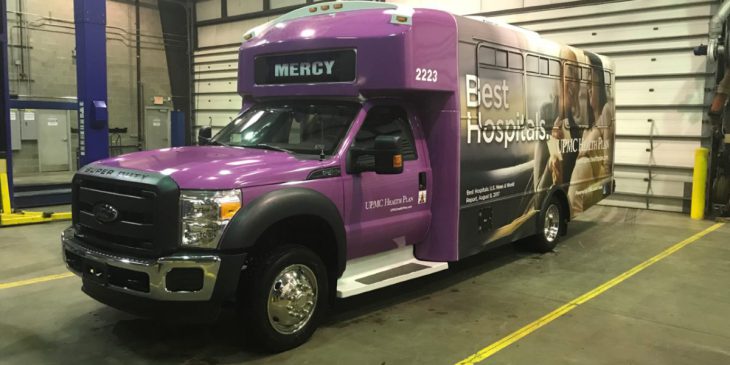While the wheels on UPMC’s employee shuttle buses go around and around, the carbon footprint they leave behind is a bit different than most similar vehicles.
For the last decade, UPMC has operated compressed natural gas (CNG) buses, gradually growing their fleet as older, diesel buses needed replacing. Today, 58 of the 60 shuttle buses UPMC operates within the city of Pittsburgh are fueled by CNG, and the fleet travels nearly 600,000 miles each year, transporting almost 1.1 million employee passengers from satellite lots to UPMC locations in Oakland, the South Side, and occasionally to downtown Pittsburgh.
Since the fleet launched in 2012, more than 1 million gallons of diesel fuel have been spared, eliminating almost 10,000 metric tons of carbon dioxide from the atmosphere. In the simplest of terms, that means less air pollution in communities where patients and staff live.
“This is a huge milestone for us,” said Tim Nedley, vice president of Supply Chain Management Operations at UPMC, “and it drives home our commitment to make a positive impact on the environment and reduce our carbon footprint.”
The fuel the buses run on is similar to the type of gas that heats houses and stoves, and the majority of the care and maintenance of the fleet happens at the UPMC garage, by UPMC mechanics.
“We are like our own bus company,” Nedley said, noting that UPMC will soon launch its own commercial driver’s license training program that will eliminate the need to outsource drivers — a transition that will save considerable cost. UPMC will also explore the addition of electric buses to the fleet as the technology becomes more readily available over the next several years.
Eliminating the dependance on diesel also comes with a cost-saving benefit. “This was a clean initiative, and it also saves a lot of money,” Nedley said. “Based on the cost of diesel fuel, the savings are approximately $26,000 each month. This is a win-win, when we can make a positive impact on the environment and cut costs while doing so.”
The impact of the buses is just one way UPMC supports the signing of the Health Care Sector Climate Pledge — the goal being to reduce greenhouse gas emissions by 50% over the next eight years and achieve net zero emissions by 2050.
“We are committed to being proactive,” Nedley said, “and it is such an important part of our environmental sustainability efforts. When it comes to taking care of the environment, it’s amazing how many passionate health care workers we have who really care. It feels like we are doing the right thing.”
To learn more about UPMC’s environmental initiatives, visit the UPMC website.








